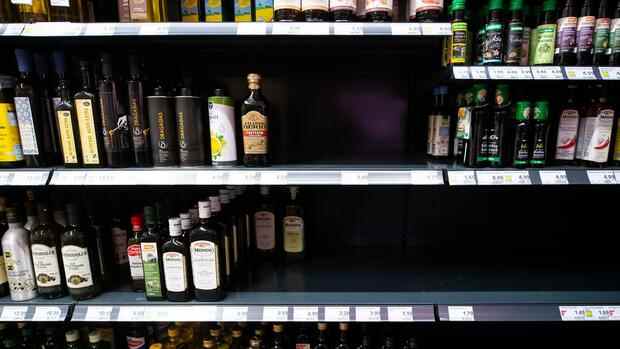Cooking oil is already scarce in many places. In the event of a gas embargo, the gaps in the food range are likely to become much larger.
(Photo: dpa)
Berlin, Dusseldorf The German food industry is urgently warning of the consequences of a gas embargo, but also of longer-term supply failures, for example of sunflower oil. He spoke in two rounds with works councils about stopping Russian gas deliveries, said the chairman of the Food, Enjoyment and Restaurants (NGG) union, Guido Zeitler, to the Handelsblatt. “Many of them have told me that if that really happens, then the lights will go out for us.”
The food industry is the fourth largest branch of industry in Germany, but has the second highest gas consumption after the chemical industry. And in the industry, with its around 614,000 employees, there is a fear that companies will no longer be supplied with Russian gas after an import ban.
Which foods are then systemically relevant in an emergency or not is controversial. Does this include luxury products such as gummy bears, candies, chocolate or beer? Or are high-energy products such as sweets just as important as staple foods such as bread, milk and vegetables in a crisis?
At least that’s the argument of the confectionery industry, for which gas is the most important energy source: “The companies in the German confectionery industry are of outstanding importance for supplying the population in Germany, especially in emergency and bottleneck situations,” emphasizes their federal association.
Top jobs of the day
Find the best jobs now and
be notified by email.
For example, the Federal Office for Civil Protection and Disaster Assistance recommends stocking up on durable and high-energy products in emergencies. “Chocolate, hard biscuits, cocoa powder or pretzel sticks are explicitly listed.”
Read more about the gas embargo here:
Gas is central in food production and is required, for example, for drying, boiling or cooking. But at least parts of the industry must expect to be cut off from the supply if fuel runs out.
Because the gas emergency plan of the federal government provides that in the event of supply bottlenecks, industrial consumers will initially no longer be supplied in order to enable private households to heat and cook for as long as possible.
Should Economics Minister Robert Habeck (Greens) at some point announce the third stage of this emergency plan and disconnect the food industry, “then there will be a shortage of products in the trade,” warns Zeitler.
However, the trade unionist also sees problems if there are persistent supply bottlenecks, for example with sunflower oil, which is contained in many products. This cannot easily be replaced by rapeseed oil. “It not only tastes different, but recipes have to be tested and changed, the shelf life of products is different,” emphasizes the NGG boss.
In addition, the list of ingredients would then have to be changed for mayonnaise or other products and the packaging would have to be reprinted. That doesn’t happen overnight.
Should the food industry be cut off from the gas supply, “then there will be a shortage of products in the trade”.
(Photo: NGG/Peter Bisping)
As far as gas is concerned, many companies in the food industry see few alternatives, at least in the short term. The brewing industry, which produces large quantities of non-alcoholic beverages in addition to beers, has made considerable efforts in recent years to reduce its energy consumption and become less dependent on gas – for example through combined heat and power plants, biogas or industrial waste heat, said Holger Eichele, general manager of Deutscher Brauer -Bundes, recently the Handelsblatt.
However, it is currently impossible to completely replace gas. Some boilers can also be operated with light fuel oil as an alternative. However, many companies lacked the storage facilities or the necessary operating permits, according to Eichele.
>> Read here: Industrial unions warn of an energy embargo – standstill of entire branches of the economy would be the result
The Veltins private brewery is trying to prepare for the worst-case scenario. “We are in serious talks in order to keep conceivable consequences of the embargo as small as possible with alternative energy sources,” General Representative Michael Huber told the Handelsblatt.
In the event of an embargo, however, considerable distortions within the entire supply chain are to be feared. “Should the entire beverage industry experience a politically desired regulation of its production capacities, consumers are likely to react uncomprehendingly to the limited food supply,” says Huber.
The dairy industry is also heavily dependent on gas. It thus covers an estimated 70 to 80 percent of its energy requirements. That was different 20 years ago. In the meantime, however, old oil systems have been replaced by modern gas burners.
“It is almost tragic that numerous companies have set out to implement the energy transition and switched from oil to gas,” says trade unionist Zeitler. Because they are the ones who would now be without fuel in the event of a gas embargo.
Closures of companies and job losses cannot be ruled out, emphasizes the NGG chairman: “Despite all the dismay at the terrible war of aggression in Ukraine, the debate about a gas embargo has a different quality when it comes to one’s own livelihood.” And belongs to the discussion to inform about the consequences of such a step.
More: Gas stop for German companies? Two bosses report how they prepare for emergencies.
